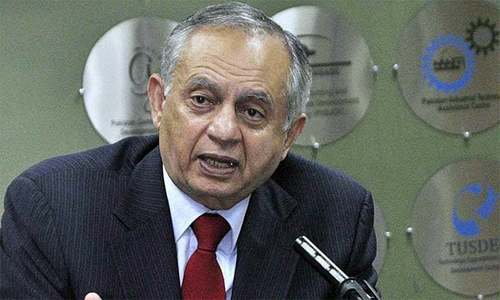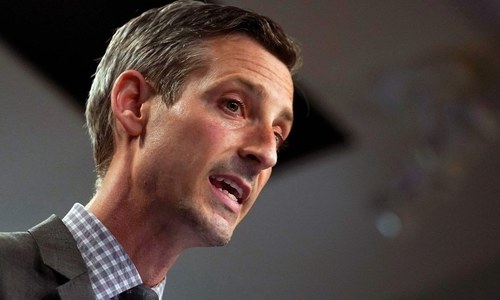WASHINGTON: Pakistan has assured the United States that peace in Afghanistan is still winnable as Washington urges Islamabad to be a “constructive partner” in bringing stability to the war-ravaged country.
Addressing the first post-Covid interaction at the US Institute of Peace (USIP) on Wednesday, Pakistan’s Ambassador Asad Majeed Khan also urged the US and China to work together to promote peace and stability in South Asia.
At the US State Department, Spokesman Ned Price called Pakistan “an important partner across any number of fronts” and said that both the countries had shared interests in peace and stability in Afghanistan.
The US official also defended Washington’s decision to withdraw all its troops from Afghanistan by Sept 11, adding that now was the time for Kabul’s neighbours to come forward.
Washington calls Islamabad ‘an important partner across any number of fronts’
“For far too long, some of Afghanistan’s neighbours have not played that role. They had been content to let other countries take responsibility,” he said. “[Now they] need to play a constructive role in helping to bring about a just and durable political settlement as well as a comprehensive ceasefire.”
Ambassador Khan reminded US policy makers that inclusive political settlement in Afghanistan would best serve the shared security interests of both the US and Pakistan. “This may not be a winnable war, but peace is winnable,” he said.
At an earlier briefing, Mr Price told journalists that the reported Taliban victories in Afghanistan would not affect the pullout deadline.
The Pakistani envoy acknowledged that the US decision to set a deadline for the pullout had created problems for Pakistan and others involved in the peace process.
He also emphasised the need for greater cooperation among Afghanistan’s neighbours, particularly Pakistan, China and Iran, with the US playing a major role as a country that has been directly involved in the Afghan conflict for the last 20 years.
Speaking about the scope of cooperation between the US and China, Ambassador Khan explained how both had the same objective, restoring peace and stability in Afghanistan. The two major powers, he hinted, could also play a key role in resolving India-Pakistan disputes, particularly the Kashmir issue.
“At least in our part of the world there is space available for the US and China to cooperate and coexist,” he said. “The US is indispensable, and China irresistible” for those seeking peace and development, he added.
For a sustainable peace in Afghanistan, “its transition from a war-centered to a normal economy is necessary,” which created room for both the US and China to work together, Mr Khan said.
USIP President Lise Grande noted in her welcoming remarks that the US-Pakistan relationship was “shifting significantly” as the time for US pullout from Afghanistan neared.
The need to ensure peace and stability in a region with three nuclear powers, India, Pakistan and China, also required Washington and Islamabad to “expand and deepen our engagement”, she said.
Ambassador Khan acknowledged that Afghanistan had defined “the tone and context” of US-Pakistan relations and a “mutually satisfactory conclusion” would definitely enhance their ability to work together. “This isn’t how it should have been, but it is,” he added. “And that’s why it’s so important for us to do it right.”
Richard Olson, a former US ambassador to Pakistan who moderated the talk, agreed with the suggestion that “Pakistan will bear the impact of an intensified civil war in Afghanistan”.
Ambassador Khan regretted that the entire conversation in Washington had come around to securing the embassy, the airport and visas for those Afghans who cooperated with US forces.
“This should not be,” he said, adding that the best investment in Afghanistan would be to back counter-terrorism measures as “peace is the best guarantee for fighting terrorism in Pakistan”.
The Pakistani envoy said that instead of over-the-horizon access to Afghanistan and military bases, the conversation in Washington should focus on “what we can do to make the peace process successful”.
Published in Dawn, July 9th, 2021














































